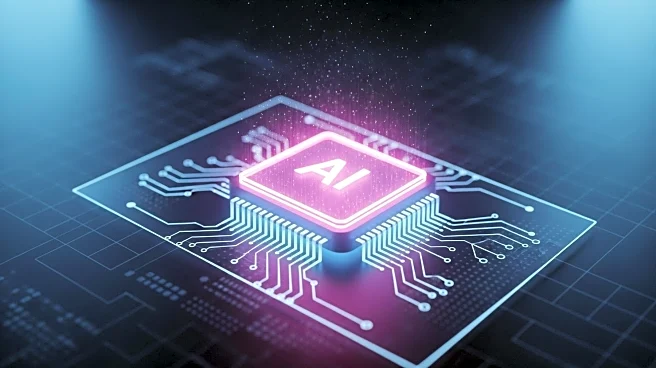What is the story about?
What's Happening?
Major technology companies are increasingly integrating artificial intelligence into social media platforms, aiming to revolutionize user interaction and content creation. This shift is marked by the introduction of AI-driven applications such as ChatGPT's Sora app and Meta's AI app, which offer features like AI-generated video feeds and interactive AI personas. These developments are part of a competitive race among tech giants to capitalize on AI's potential, despite concerns about the authenticity and legality of AI-generated content. The Motion Picture Association has raised alarms over potential copyright infringements, while OpenAI and Meta have implemented safety measures to address these issues. Additionally, there are growing worries about the impact of AI chatbots on teenagers' mental health, prompting companies to enhance protections for young users.
Why It's Important?
The integration of AI into social media platforms represents a significant shift in how content is created and consumed, potentially altering the landscape of digital communication. This development could have profound implications for industries reliant on intellectual property, as AI-generated content raises questions about copyright and ownership. Furthermore, the ability of AI to produce lifelike videos and images heightens concerns about misinformation and the spread of fake content, challenging existing regulatory frameworks. As tech companies navigate these complexities, the outcome could influence public policy and societal norms regarding digital content and privacy. The race to dominate AI-driven social media also underscores the economic stakes for tech giants, as they seek new revenue streams in an evolving digital economy.
What's Next?
Tech companies are likely to continue refining their AI tools to address legal and ethical concerns, including implementing more robust copyright protections and exploring revenue-sharing models with content creators. As AI technology advances, regulatory bodies may need to establish clearer guidelines to manage the implications of AI-generated content. Additionally, ongoing lawsuits related to AI's impact on mental health could prompt further scrutiny and potential policy changes. The evolution of AI in social media may also lead to new opportunities for influencers and content creators, as platforms aim to attract the next generation of digital stars. Stakeholders across industries will be closely monitoring these developments to assess their impact on business models and consumer behavior.
Beyond the Headlines
The integration of AI into social media platforms could lead to broader cultural shifts, as users adapt to new forms of digital interaction and content creation. Ethical considerations surrounding AI's role in shaping public discourse and influencing perceptions may become increasingly prominent. The potential for AI to democratize content creation by lowering barriers to entry could also foster greater diversity in digital media. However, the risk of deepfakes and misinformation poses challenges to maintaining trust and authenticity online. As AI technology becomes more sophisticated, society may need to grapple with questions about the nature of reality and the boundaries of digital expression.

















